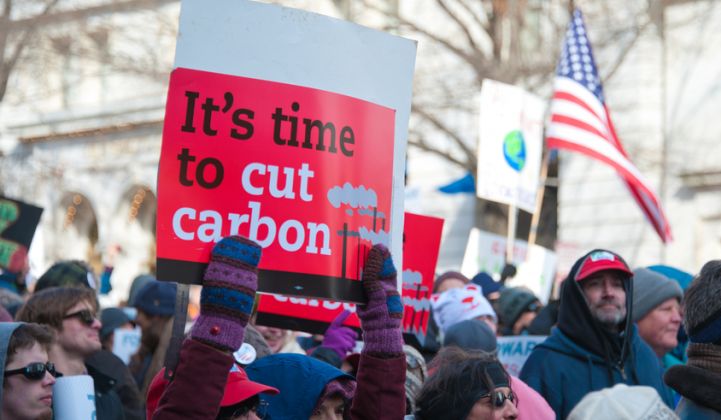We’ve been hearing about the Keystone XL pipeline for years. The short story: the $7 billion pipeline, which would deliver 830,000 barrels of tar sands oil from Canada per day through the U.S. heartland, has been a serious political sticking point.
President Obama has pledged to veto Keystone, with opponents arguing that projected job gains are minimal and tar sands are among the dirtiest extraction methods in history. The Republican-dominated Congress is positioning the veto as a jobs-killing move that holds back American energy leadership.
Let’s be realists for a minute. Oil prices are sinking fast -- which means that oil companies are less likely to produce more oil from the tar sands. If this keeps up, Keystone may not even pencil out (for now).
Moreover, if oil prices do return to previous levels, Keystone wouldn’t make a difference in the fight against climate change. Michael Levi of the Council on Foreign Relations recently concluded that “both the climate damages and the economic benefits from Keystone XL are small in the grand schemes of climate change and the U.S. and global economies.”
Still, it’s essential to recognize that Keystone has become a symbol and is one of the top issues for environmentalists. For many Democrats, authorizing Keystone reflects a return to dirty fuels, reversing the strong growth in clean energy over the past few years.
Moreover, Keystone is one of the few initiatives the Democrats have never caved on. And neither have environmentalists. For a party prone to soul-searching, questioning and associated infighting, standing strong behind one controversial issue is a shot in the arm to the base.
Yet Republicans -- and some Democrats -- want this pipeline. Obama’s position has prompted Speaker Boehner to call Obama “hopelessly out of touch,” and many in Congress have vowed to push Keystone. Some experts believe that Republicans are pushing Keystone in order to portray Obama as an obstructionist and boost their chances in the 2016 presidential elections.
In short, the Keystone XL pipeline has become one of the biggest bargaining chips in American politics. The heat is on; it’s time to capitalize.
A proposal: let’s make a megadeal.
Authorize Keystone XL. If a Republican wins the presidency in 2016, it’ll happen anyway. But in return, it’s time for clean energy advocates to play hardball -- and get something meaningful in return for it. In fact, get a lot meaningful for it.
This is the time to break out the cleantech-policy Christmas lists. A few ideas to get started:
- A longer-term phase-out of the ITC, from 30 percent to 25 percent to 20 percent and so on -- avoiding the cliff that can damage a nascent industry
- More green banks and more green investments -- yes, funded by the DOE
- Helping to move forward funding mechanisms like PACE that are key to powering energy reductions and energy independence
And my favorite: Require all federal buildings to go solar. If we’re going to lose out on the symbolic impact of denying the Keystone XL, let’s gain the symbols of the solar Pentagon, the solar Capitol, solar embassies, even the solar Yellowstone Visitor Center.
A semi-functioning government with solar on top could actually nudge the country together while making the do-nothing and largely despised Congress a little more credible -- ultimately good things for the country.
Moreover, a roster of smart policies would do far more in accelerating the clean economy and combating climate change than stopping Keystone ever could.
Cave on the Keystone XL battle. Win the long-term war against climate change.
***
Matt Stewart is a vice president at Antenna Group, a strategic communications agency for transformative companies in energy and technology.



